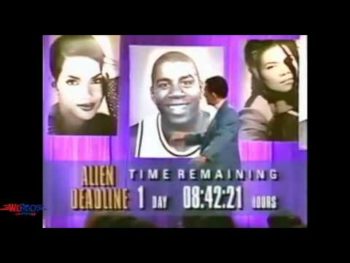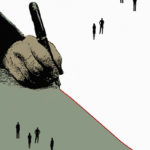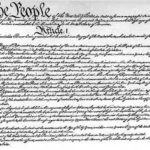Let’s Talk About Race and Racism: The Space Traders-Science Fiction and Critical Race Theory
Critical Race Theory has come to dominate how many modern people think about race and racism. I’ve mentioned this theory before, but have only offered a partial definition. Personal time doesn’t allow me a full explanation of the origins of Critical Race Theory (CRT), even though I think CRT is an important topic worthy of discussion. But it so happens that one of the founders of CRT, Derrick Bell, crafted a science fiction story called The Space Traders intended to illustrate the plight of black people in modern America. This post is a discussion of that science fiction short story and how its backstory stemmed from a number of the ideas central to CRT. And…by the way…we are finally on a subject that’s clearly on topic for Speculative Faith–science fiction!
Why Science Fiction?
The science fiction of Derrick Bell’s story isn’t particularly complex–the “science” element amounts to advanced aliens making an unusual proposal to the human race. Most of characters–well, all characters but one–are one-dimensional. Nor would I consider the story especially well-written. That’s not really surprising, because Derrick Bell was a law professor and not a science fiction writer.
But of course science fiction is the perfect medium for illustrating an idea. Science fiction has long been a means of social commentary by imagining counter-factual situations, such as: What if we are all in a computer simulation? (the Matrix) What if genetic fitness becomes the basis of a future society? (Gattaca) What if aliens invaded us in the same way we historically invaded colonial possessions? (the War of the Worlds) Etc.
As a short story, The Space Traders, first published in 1992, has been pretty successful. It’s been featured in several anthologies and was adapted for television once upon a time. (Here’s a link to the Wikipedia article on the story and also a link to the full text of the tale should you want to read it–it’s just shy of 12,000 words long). But again, I’d say that’s because of the controversial nature of the subject of the story, rather than it’s style. (Though on the other hand, it’s not a terrible story, either. The ending is pretty powerful.)

What the alien ship might have looked like. Image copyright: The Atlantic.
The Space Traders Summarized
The central character in The Space Traders is Gleason Golightly, a conservative black man who is an economic advisor to a white Republican president. As I’ve said, he’s the only character in the story with any depth. Though the story doesn’t begin with him.
The tale starts in a near-future scenario–from the point of view of the Nineties–in which aliens mysteriously arrive on January 1st and offer the United States unlimited clean energy and vast wealth–with a catch. All the aliens want is the USA to hand over every single person in the country who identifies as black. For purposes unknown.
The tale begins on 1 January and counts up until 17 January–which in the story world is a Martin Luther King Jr holiday…and also the day the United States ushers all black citizens into the alien ship cargo holds. Irony blatantly intended.
The story says the aliens adopt a voice like the former president Ronald Reagan, which causes all white people to trust them but causes suspision in all black people in America. I’ll comment on this further down.
Action leaps to the White House and of course the conservative cabinet is all for making this exchange. After all, in this story world, their conservative policies have wrecked the environment and bankrupt the country–they despirately need the alien technology and wealth to rescue the country from its dire straits. (I won’t comment on this further, but yeah this bit of story backdrop is more than a bit over-the-top-politically-liberal.)
But they want to hear from their token black economics advisor–the story directly calls him “token” (and mentions black people see this character as an “Uncle Tom”). The concerns of the cabinet being: “How can we sell this exchange to the public?” and “How can we justify our actions?” and “How can make this work legally?” rather than, you know, the ethics of the situation.
The story says directly that if the aliens had asked for any other sub-group of people, such as green-eyed red heads, the exchange would never have been considered for a moment. I’ll comment on this in a bit.
Golightly naturally doesn’t want the exchange to take place. The story from this point forth is about his efforts to first avert the exchange but when his efforts fall through, to save himself by escaping to Canada.
His strategy to derail the exchange is that he meets with a group of black Civil Rights leaders and attempts to persuade them they should speak out in favor of the trade. If they could only show that black people are in favor of the prospect of being hauled away by mysterious aliens, then white people would themselves wonder why black people were for it, which would be their best chance to save themselves. Because, you know, if black people want the exchange, white people won’t want to give it to them. Reverse psychology.
Golightly fails to persuade the black community leaders. They think his idea is crazy–but he despairs when they don’t listen to him.
To legally get rid of all blacks, the USA needs to enact a constitutional amendment in which the military draft is applied to black people. So all will be drafted into “service” for the good of the rest of the country. Bell mentions a few legal parallels to this, specifically stating the US Constitution itself sacrificed black people for the purpose of making the USA, so the idea the nation would do so again isn’t unthinkable.
The story spends a bit of time talking about the Liberal opposition to the amendment allowing the exchange. Part of New York City is shown to be shut down for a while due to protests led by Rabbi Abraham Specter, with the cooperation of many American Jews. The story says at one point what the Jewish motivaton is–they don’t want to be the ones stuck at the bottom of the social order to receive the full ire of angry poor whites. So they want black people to stay.
Other, non-Jewish Liberals are referred to in that thirty percent of the USA is said to be against the amendment, while seventy percent are for it. Note that the US population of African Americans is about eleven percent, so nineteen percent of the rest of America were against the exchange. The Jewish population of America is less than nineteen percent and I can’t imagine Bell missing this detail, so clearly other, non-Jewish Liberals also opposed “the Trade.” The story never says who were the other Liberals, but it does assign them a motivation: Guilt.

A scene from The Space Traders in the HBO special Cosmic Slop. Copyright HBO.
Golightly attempts to make the case early on with the cabinet that white people will be extremely afflicted with a sense of guilt after the fact if they trade off all black people for the alien tech. This doesn’t affect the cabinet, but as far as the story is concerned, guilt is the only motivator to want to help black people other than not wanting to be at the bottom of the social order yourself.
The aliens warn the United States government that they if they let black people escape to other countries, the deal will be off. The story references a few getting away, but the USA mostly blocking any escapes. The federal government promises to send a few prominent black people to other countries in exchange for their help, including Golightly and his wife, but they take back this offer in the end.
The second to last moment of the story features Golightly trying to escape to Canada but being caught by the US Secretary of the Interior, a colleague Golightly worked with and knew personally. His wife wondered if black people would have been worse off if Golightly had managed to block the legislation, because black people would be blamed for the country not receiving aliens’ benefits. The story basically leaves this comment hanging.
In the end, the aliens require all black people to strip down to a single article of clothing before boarding the ship. The story pointedly says they leave the United States in the same way their ancestors had arrived. As ship’s cargo.
The Space Traders Criticized
There’s much in this story I disagree with, but I can summarize all my objections in three points. However, Bell made one point in which I believe he was entirely right to criticize the United States. I’ll mention where I agree with him last.
Disagreement #1. According to The Space Traders, all Black People are the Same
This point isn’t secondary to the story. All black people in the United States suffer the exact same fate. The protagonist Gleason Golightly in various ways attempts to escape his fate, but in the end, being black is something he cannot escape. He is turned in and taken away, just like every other black person.
The story is just a story and is allowed to engage in hyperbole for the purpose of making a point. But I don’t think Critical Race Theorists see any hyperbole here. All black people in their view are in the same boat. Which is on the one hand ridiculous–there’s a huge difference between Oprah Winfrey and a black man who’s a fourth generation felon in maxiumum security lockup. To suggest otherwise in absolute terms is again, ridiculous.
However, there’s a tiny particle of truth here. Both Winfrey and the hypothetical felon I mentioned can be subject to worse treatment than they might otherwise receive due to racism. That much is true for both. But for Winfrey, being subject to occasional racist slights doesn’t prevent her from being a billionaire and one of the most admired people on the planet. The guy in maximum security has a different life experience.
However, my objection to the “same fate” assertion aside, my biggest beef with the idea that all black people are the same is that Gleason Golightly (hey, look at this last name for Pete’s sake) in fact is just as cynical about white people as all other black people. He just knows how to manipulate the system to his advantage better. So the story leaves no space for blacks to actually be conservative. No, if they seem different, it’s because they are working the system.
This is observed in the opening scene. The aliens speak like Ronald Reagan, which white people in the story trust, but black people don’t. All black people. There’s no room in the story for some black people to have liked Reagan–no, all are assumed to be the same. Or merely pretending to be different, like Gleason Golightly. There’s no space for individualism or individual convictions.
Note, someone could also say the story also portrays all white people as being the same, but it actually doesn’t. Jewish people are in particular set aside from other white people and the story further implies that guilt-ridden whites might actually desire to help blacks. I think that’s hugely significant and will say more about it in a bit.
Note also that Critical Race Theorists do not hold to real racial differences. They believe race is a social construct and the biological differences in race are minor–I totally agree there. But at the same time, they hold all of the United States–and broader, the whole world to a lesser degree, basically is acculturated the same way concerning race. So the unanimity of racial experience this story treats and inescapble and I think CRT in general treats race and racism as inescapable.
Disagreement #2. Racism is the Central Axis of Oppression–Nobody Would Sell Green-Eyed Redheads?
The story flat out says that nobody would have considered for one moment a request from the aliens to take, for example, green-eyed redheads. Really? Such an assertion is easily shown to be false.
Remember the post I did on Speculative Faith that talked about how early plantation owners found out African indentured servants were more profitable that Irish indentured servants? Because the Irish died at higher rates from malaria? At the end of a period of seven years service, both Irish indentured servants and African indentured servants used to be set free, with a small “gift” of land and a few tools…which didn’t cost that much for the Irish, because a lot of them didn’t live out the seven years.
Whereas for the West Africans, many of whom carry a recessive sickle cell gene that makes them resistant to malaria (one of only a few genuine biological differences in races), that got too expensive. So the plantation owners pressured the colonial legistatures to change the legal status over time, so that black people would not be set free. To protect their profits. (Then the society became increasingly racist to justify their position of dominance.)
But let’s not forget that at one point in Colonial history, a certain number of green-eyed redheads were in fact shipped to the Americas and forced to work on plantations. White people did in fact sell white people.
And not just there. Slavs sold other Slavs down the great rivers of Russia for money (some people claim the word “slave” derives from the more ancient ethnic term for the Slavic nationality). Aztecs enslaved other tribes of Central Mexico. And West Africans in positions of power helped capture other Africans–and sold them to European slave traders.
The central premise of the story, of human beings selling other human beings to gain something for themselves is something we see over and over again in the pages of history. Sadly. Tragically.
But the idea that only because of racism would someone consider such a trade–that idea is false. Easily shown to be false.
Disagreement #3, White People Will Only Help Black People from Negative Motivations
In the story, there are only two motives given for white people to help blacks. One, to not be left alone at the bottom of the social order, specifically applied to Jewish people–which might make sense in the context of the story, but does it make sense in the real world? Do Jewish people help black people with the notion that doing so will always keep black people inferior to them?
Actually, if we imagined this to be true of white people who help blacks in general, it would be subversive to CRT, or at least I think it would be. Could it really be that white people believe helping black people will keep them eternally superior, social-standing-wise, to blacks? Ugh.
Look, I have no trouble perceiving that human beings are riddled with evil motivations, but that’s some awfully dark stuff right there. If this idea were to be taken seriously, even the so-called white “allies” of black people are not to be trusted. They are really doing it for themselves.
Lest someone say I’m reading too much into the story, Derrick Bell directly said that the only time white people help black people is when “interests converge” so that white people are getting something out of it (he said so in multiple ways, but for an example, follow this link).
Hey, is it true that a lot of what human beings claim is helping others really has a lot of selfish motivations, at least most of the time? Yes. Again, I agree humans are sinners. But is it always true that the only time any white person helps blacks is for self-interested reasons? Is this particular kind of self-interest worse than all other kinds? No, it isn’t. (Or else white people would not have gone through cycles of helping and oppressing one another in Europe before the Transatlantic slave trade ever began.)
And the other motivation the story give? Guilt.
White Guilt But Not Empathy
The Space Traders doesn’t portray a single white person showing genuine empathy for black people. Rabbi Specter seems empathetic for a bit–but then his true motives of self-interest are revealed in the story.
Guilt is mentioned as something white people will experience after the fact of betraying blacks–but isn’t guilt at least somewhat related to empathy? Isn’t it possible to appeal to those white people who have suffered in life based on their hardship that black people are also suffering? Some of whom are suffering worse? All of whom who are subject to random racism?
But that’s not the argument CRT makes. Instead it talks about “white privilege” in the singular, as if all white people have the same life experience as one another. A proposition which white people who have suffered more than normal in life find especially distasteful.
Doesn’t tapping into “white guilt” seem to be the motivation behind mentioning “white privilege”? So The Space Traders and Critical Race Theory acknowledges there’s such a thing as a guilty conscience. That in spite of being sinners, we have this grace that can lead to repentence.
This is very important to undestanding Critical Race Theory in my estimation–such theorists want to help black people and other oppressed minorities. But in general, they only think white people will help them if they get hit between the eyes with their own guilt of racism.
Almost Like a Revival Meeting
Isn’t this almost like the old-fashioned Evangelical revival meeting? “You know you are a sinner! Come forth and repent, and you shall be made clean by the blood of Jesus!” And people got up and walked the aisle, thowning themselves down in repentant prayer.
“You know you are a racist! Disavow your racism and denounce those who have not yet repented! Then you can feel that you are clean!” So people come out, snarkily attacking anyone who dares question white privilege. Creating a divide, where the “repentant” develop true missionary zeal, but people who might be empathetic on racial issues become less empathetic, because they don’t believe they are especially sinful, thank you very much.
You know, I don’t want to deny individualism. I deeply believe in it. So I will not assert all white people who embrace CRT have the same motivation. Not so.
But if we are going to play the game of imputing motivations on people other than ourselves in broad, sweeping terms, such a method can make supporters of Critical Race Theory look as bad as anyone else.
A Point of Agreement
One thing The Space Traders pointed out that I agreed with and which I’d never thought of before. The story makes the observation that black people had been sacrificed for the nation before, so doing so again wasn’t unprecedented.
It specifically made mention of the US Constitution, which I also talked about in a previous post. I said in my previous post that the Constitution’s 3/5 compromise was a result of a political compromise between those who were against slavery and those who were for it. And so it was.
But The Space Traders pointed out that this compromise in effect sold out black people for the greater interests of the country. If the anti-slavery founders had been so anti-slavery, why had they not insisted on getting rid of slavery before making a federal union? Why hadn’t they refused to form a union with people dedicated to slavery?
We can say much about the history of the time, that the general expectation of many in the North was that slavery would come to an end on its own and that the Constitution actually reflects this expectation. Yes, I agree that was the common belief in the North and even some Southerners also agreed slavery would eventually end (though some disagreed with that very much). But so what?
It is actually true that anti-slavery Northerners sold out black people for the sake of making a single federal union. They compromised–in a negative way.
We could imagine things would be even worse for black people if there had been a Northern Union and a Southern Union from the beginning. But we can’t be sure about that–and it’s no excuse anyway. Yes, it really has happened in US history that black people were sacrificed for what some people considered expedient. Though not just black people–but Critical Race Theory applies to other groups as well, so there’s no disagreement here.
Conclusion
My next post will talk about some other things that I think Critical Race Theory actually has seen correctly (in addition to offering new criticisms of it). There’s actual evidence of structual inequality in America. But such inequality doesn’t quite run down racial lines like is often implied. Nonetheless, such inequality should be addressed in a society that wants to be a meritocracy–it’s not fair to make some people run a metaphorical race with weights strapped to them that others don’t have.
But that’s for next time.
As for this week’s post, who has read The Space Traders? Do you agree or disagree with my analysis? Do you know of other science fiction or speculative stories that address race in a way as meaningful (or more) than The Space Traders? Please let me know your thoughts in the comments below.










































When people are furious and/or new to writing, it’s pretty common for them to write about issues in one dimensional ways like this. Either they don’t understand their ‘opponents’ as well as they think they do, or they don’t know how to express/depict the issues in a realistic and nuanced way.
That’s where a lot of these advocates tend to lose people. As I read your summary, I had reactions like ‘If I were in charge, I would have been immediately upset and suspicious of the aliens coming in and making a proposal like that’, and ‘I seriously doubt my (white) cousin would have been ok with giving up her (black) husband and children’.
And considering the history of the Holocaust, there would have probably been at least some Jews that were extremely against the idea of an entire race being shipped off like that. Maybe some of them would have reacted like the chars in the short story did, but from what I’ve seen it’s reasonably common for Jews to feel wary of anything that reminds them of what their people went through(which is of course understandable). And a lot of them don’t want that history to repeat, no matter what races are involved. If the author of The Space Traders ignored possibilities like that and only(or even primarily) showed nefarious motivations from the Jewish chars, he could easily be accused of being racist to Jews.
In spite of any inaccuracies a story like this might have, though, it’s important to really understand and figure out where the person is coming from and why they’re saying certain things. When someone talks about guilt in that manner, for instance, it’s because they feel like the only time progress is made is when they get in people’s faces and attack their character. Otherwise, they don’t see many people speaking out against racism or finding meaningful ways to fix it. But if that becomes someone’s primary mode of enacting change, they’re more likely to feel bitter because they have to twist people’s arms to get results. When someone has to do that on a consistent basis, one of the few conclusions they can draw is that people don’t actually care and only do things to avoid feeling bad(whether the bad feelings are guilt or losing comfort or whatever).
Guilt is only one component of empathy. So if it’s the only component present then it truly can come off as selfish, whether or not it actually is. This leads to an endless cycle, though. One one hand, people realize that even if they truly do care and help others in their daily lives, no one will believe it unless they actually show some sort of proof to the world. But showing proof can get someone accused of pandering, looking for absolution, or just wanting a pat on the back. So some people are stuck between two accusations: ‘I won’t believe you care unless you show me, but if you show me I’ll just think you’re being fake.’
Of course it’s not always like that, and people SHOULD genuinely care and try to help others. But we should stop assuming that if we don’t see the exact facial expressions, behavior, social media posts, etc from another person, that person is automatically indifferent or fake. There’s a million and one reasons behind people’s behavior, and if we can’t even take the time to figure out what’s actually going on, then maybe we don’t have any business going after people unless it’s an actual emergency. There’s a lot of better ways to solve problems.
The story featured the character Rabbi Abraham Specter talking about the story set-up as a “Final Solution” for American Blacks–i.e. the character objected based on the Holocaust, based on Jewish history.
But a moment of omniscient narrator revealed Specter’s real motivation was something else. What I said in my post.
Yeah, that was not very kind of the late Dr. Derrick Bell. I think this related to his opinion of the black situation being one white people will never do anything to help unless it’s in their self interest. Which was really a very negative opinion on his part.
As far as showing proof of help is concerned, yeah, that can be difficult…
Yeah, that doesn’t surprise me.
Since I have a little time I’m going to go ahead and clarify some things too, for the sake of whoever else might be reading the comments. I mostly believe authors can/should write however they want, so my earlier comment WASN’T to say stories like Derrick Bell’s “shouldn’t exist”. I also dislike it when people accuse authors of bad things solely based on a few stray comments they make or what the chars in their stories are like. Because of that and the fact that I know next to nothing about Derrick Bell, I’m willing to give him the benefit of the doubt on some things. Maybe he wasn’t trying to say that all Jews were bad. Maybe he was just pointing out how people ASSUME minority groups will help each other when the reality is that they don’t always. Sometimes authors miscommunicate very badly when they write, and it’s not necessarily because they’re racist toward the group in question. Bell could have easily been so focused on the point he was trying to make that he didn’t realize how his writing came across.
As far as how unrealistically he portrayed whites, maybe he was going for A Modest Proposal type strategy, where he greatly exaggerates certain things to get his point across, get people thinking, and motivate better behavior from others. (In the case of this story, maybe he hoped it would make white people care a little more and decide to help, just to prove the story wrong or something.) And maybe the story isn’t nearly as bad as it sounds from the plot summary.
All that said, even though I don’t think the story should be dismissed out of hand or attacked, it isn’t above critique either. A story that works so hard to point out racism seems hypocritical if it does something that could blatantly be taken as racist toward a different minority group (Jews in this case). Especially when read during a time when cancel culture is quite rampant and willing to eat someone alive for accidentally writing a story that implies bad things about a minority like Bell did. And then if its portrayal of whites, Jews, etc comes off as a mix of hateful and unrealistic, it makes it look like the author hates other races for things that aren’t even true. And it isn’t bad to question whether or not his story actually helps. Or helps in the right way.
Honestly, just about everything a person does has positive and negative consequences. A story like this might be good for stirring the pot a little and inviting conversation, but if it’s meant to be the primary narrative of how we view each race, race relations, people’s behavior, etc, it could end up being kinda toxic. I’m somewhat reserving my judgment since I haven’t actually read the story, but these are some of my thoughts based on what I’m hearing.
When I was younger, one of my favorite book series was The Lionboy Trilogy by Zizou Corder. It’s been forever since I read it, but from what I recall it did a decent job handling race. That certainly wasn’t the focus of the book, but it did a lot of good things, like have an interracial family in the forefront and portrayed positively. The story called out racist things that other people did, but it was about getting angry at backwards people, rather than acting like any particular race was bad. The book was written by a mother and daughter team and from the picture in the back of the book, it looks like they are a mixed family as well and are probably writing partly from their own experiences.
The basic premise is that the main character, Charlie, is the son of two scientists. During his infanthood, he was on a research trip with them and, due to an incident, gained the ability to speak to cats. One day, he returns home to find his parents missing. After evading the kidnapper himself, Charlie goes on a journey to rescue his parents. His ability to speak to cats comes in handy in terms of finding clues. Eventually, he also encounters a pride of circus lions, and they promise to help him find his parents if he helps free them.
I’d say Zootopia also did a decent job of bringing up racial issues. It was clever in the way it used common stereotypes of animals for both comic relief AND addressing stereotypes people have of each other. It seemed to have lots of little things people from different backgrounds can relate to, and the characters were approached with a decent amount of nuance. A lot of people enjoy the main chars and like watching their journey, so they’re going to be more open to watching the show and discussing it without getting defensive.
Obviously Lionboy and Zootopia aren’t perfect or all encompassing discussions of race, especially since they have to stay reasonably clean for younger audiences, but they are good for conversation. And even if an adult didn’t care to view them because they’re ‘for kids’, those stories are probably still good for bringing up and discussing the topic with children.
A story aimed at adults that tackles race very directly would be The Help by Kathryn Stockett. I’ve only seen the movie, though. But it’s very good. Not speculative, though.
If we are mentioning books that aren’t speculative but tackle racism, I remember the Phantom Stallion series by Terri Farley did so several times as well. That’s another series that’s meant to be family friendly, but maybe an older person would enjoy it too if they were looking for something about horses and ranch life.
In sixth grade, Roll Of Thunder Hear My Cry was assigned reading in my class and it was pretty good. Not my usual genre, but it was pretty interesting and there were several storytelling aspects I liked and respected it for.
Enemy Mine, which was about war between humans and aliens as a not-too-thinly disguised shot at all prejudice, ethnocentrism, and racism, was probably my favorite movie relating to racism.
Glory, about the Civil War era unit with black soldiers and white officers is another favorite of mine. However, in recent times Glory has been criticized for portraying someone with a desire to be a “white savior.” Which in fact may have been sort of true that the commanding officer thought that way–but nonetheless, black and white men fought together in one unit, which was good thing.
I don’t think I’ve heard of those before, but they sound interesting.
I just remembered that movie that came out a few years ago called Bright. Will Smith played the main character. It takes place in an alternate universe where faeries, orcs, etc live along side humans in modern times. The main char is a cop that ended up working with the first orc police officer. Racial prejudices are described and part of the plot.
Yeah, I saw Bright. Was pretty good. Another one was the sci fi series Alien Nation (from the 90s, before your time).
District 9 wasn’t really my cup of tea, but it made some important points about racism, too.
I did see and enjoy District 9 🙂 I was born in 94, but yeah, I don’t think I’ve ever seen Alien Nation. Maybe some day, though.
It’s been forever since I’ve seen District 9, but what did you dislike about it? I’m kind of curious now.
Due to circumstances, I don’t really have the energy to engage with this much, so feel free to assume that Travis is wrong about a couple-few points.
I read the story. Please read it yourself if you haven’t, then offer your thoughts when you feel more energetic…based on what the story actually says. Thanks.
Nah, it’s more meta than that. I’m willing to take your word for it that it’s a clunker written by someone who isn’t talented in That Way, bless his heart.
It’s that this is a piece with great amounts of cynicism, but that is what you think is wrong with it. Henry James and Aldous Huxley in Brave New World can be cynical, but this guy is not allowed to be cynical? Granted, he may not be talented enough to be good at it, but there’s not really any reason he can’t be critical of society and specifically white people.
Hi, Travis Perry
I am thinking about adding a couple of your points to one of my academic paper’s. I am exploring the conversation in The Space Traders short-story (Dark Matter). And adding my personal perspective to it.
Why do the aliens (space-traders) see black lives as valuable when white people don’t question or see their value? And is this merely seeing them as something of value, or more so, comparing black lives as objects that they can use?
Are human lives worth more than any material or resource?
Why did white people not question the offer as something of concern?
Is this book repeating history? By looking at the comparison between The Atlantic Slave Trade and The Space Traders (Voyage in Space). Is this adaptation comparing The Space Traders to White slave owners?
If you have any ideas, publications, or creditable research,. Send them my way. I hope I can expand on the conversation. I am more interested in seeing your take and you’re evidence to back up your claims.
Please forgive a few of my grammar typos. I keep getting autocorrected, gotta love technology 🙂